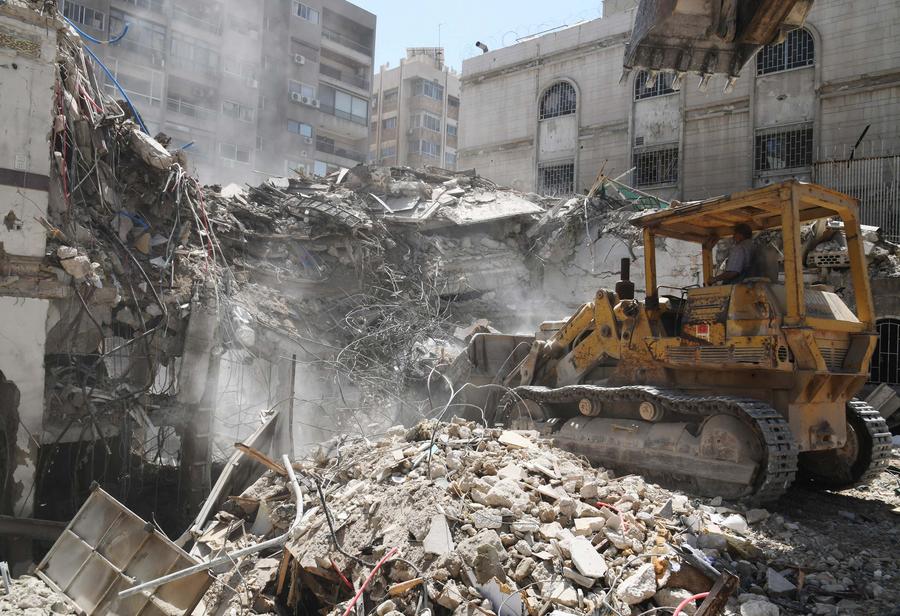Iran set to retaliate for Israel's consulate attack in Syria: experts

People gather at the site of an Israeli missile attack targeting the building of the Iranian consulate in Damascus, Syria, April 1, 2024. (Photo by Ammar Safarjalani/Xinhua)
TEHRAN, April 6 (Xinhua) -- Iran is set to retaliate for Israel's recent attack on the Iranian consulate building in Syria, though the way, severity and timing of Iran's response remain to be seen, Iranian experts said.
Israel on Monday launched a missile strike on the consular section of the Iranian embassy in the Syrian capital Damascus, killing seven Iranians, including two veteran commanders of Iran's Islamic Revolution Guards Corps (IRGC), and a number of Syrian civilians.
Following the attack, Iran's Supreme Leader Ali Khamenei vowed in a message that the country's "brave men" would inflict "a regret-inducing punishment" on Israel for its "criminal" attack. Iranian President Ebrahim Raisi also vowed that the "cowardly crime will not go unanswered."
ISRAEL CROSSES ANOTHER RED LINE
Seyed Reza Sadr al-Hosseini, a Tehran-based senior expert on West Asia issues, said that Israel was acting like a "drunk person" as it hit a "strategic dead end" on the issue of Palestine, especially in the Palestinian enclave of Gaza Strip, where Israel has been launching a military campaign to wipe out the Islamic Resistance Movement (Hamas) since last October.
Supported by the United States and a number of the European members of the North Atlantic Treaty Organization (NATO), Israel's moves "have crossed all possible humane red lines," Sadr al-Hosseini told Xinhua in an interview.
He cited Israel's killing of more than 33,000 people in Gaza and the latest attack on the Iranian consulate building in Syria as among the "red lines" crossed by Israel.
Sadr al-Hosseini said the Israeli attack on Iran's embassy in Damascus was "a cowardly and brutal move" that violated all international conventions and agreements, especially the Vienna Convention on Diplomatic Relations (1961).

A rescuer works at the site of an Israeli missile attack targeting the Iranian embassy's consulate building in Damascus, Syria, April 2, 2024. The Syrian Defense Ministry reported that on Monday, around 5:00 p.m. local time (1400 GMT), Israeli forces carried out a missile strike from the direction of the occupied Syrian Golan Heights, targeting the Iranian embassy's consulate building in Damascus. (Photo by Ammar Safarjalani/Xinhua)
In an analysis published by the semi-official Mehr news agency on Wednesday, Asghar Zarei, a Tehran-based foreign policy affairs expert, said the Israeli attack was an "adventurist and dangerous" move taken due to Israel's failure to reach its targets in Gaza as well as the unprecedented economic losses and casualties it suffered in the conflict.
Zarei believed that Israel committed the "crime" of attacking the Iranian embassy in Syria at a time when it was at the "peak of desperation and inability" to manage the war in Gaza.
By attacking the Iranian embassy, Israel aimed to divert media attention and global public opinion away from the "Israeli crimes committed in Gaza," he added.
In an analysis published by Iran's official news agency IRNA on Tuesday, Ahmad Sadat, a Tehran-based regional affairs expert, said the Israeli attack had roots in several social, political and security issues and was aimed at expanding regional developments and their far-reaching consequences.
Sadat said that, in addition to the failure to achieve its announced objectives in Gaza, the Israeli government led by Prime Minister Benjamin Netanyahu is also facing deepening internal differences among the cabinet, rising inflation, and the fatigue of the Israeli soldiers in Gaza, which have led to calls for Netanyahu's resignation.

People take part in a funeral procession for the seven Iranians killed in the Israeli attack on the consular section of the Iranian embassy in the Syrian capital Damascus, on International Quds Day in Tehran, Iran, on April 5, 2024. (Xinhua/Shadati)
IRAN'S RETALIATION IS CERTAIN
On the possible response to Israel's blatant attack on the Iranian embassy in Syria, Sadr al-Hosseini said that Iran would use all its diplomatic capacities and moves, including filing a complaint at the UN Security Council and raising the issue at the General Assembly, while reserving the right to give a proportionate response to the Israeli attack "at the right time and place."
He added that it was not possible to predict the timing, method and level of Iran's retaliation against Israel, or if Tehran's retaliation would be taken through a direct move or done by its friends in the resistance front.
Zarei believed that Israel would receive "a fitting response" for its attacks, as Iran had previously shown that it was able to deal a "deterrent" blow to Israel.
"This time, Tehran's response to the Israeli aggression would be costly and painful for Israel," he said, adding that any Israeli diplomatic missions could be a potential target for attacks by resistance groups in the region and those against Israel.
In his analysis, Sadat pointed out that Iran's response to the attack on the Iranian embassy in Damascus aims to "maintain the balance of threat and create the necessary deterrence."
Iran's response should be in proportion to the Israeli attack or even "outweigh" it in terms of size and casualties, he said.
Photos
 Migratory birds spotted in Karamay, NW China's Xinjiang
Migratory birds spotted in Karamay, NW China's Xinjiang Tourist-dedicated New Orient Express gears up to offer luxury train travel around NW China's Xinjiang
Tourist-dedicated New Orient Express gears up to offer luxury train travel around NW China's Xinjiang Spectacular sea of blooming rapeseed flowers attracts tourists to Yueqing, E China's Zhejiang
Spectacular sea of blooming rapeseed flowers attracts tourists to Yueqing, E China's Zhejiang Rare bird species spotted in north China's grassland
Rare bird species spotted in north China's grassland
Related Stories
- Israel prepares attack on Rafah as truce talks resume in Egypt
- Iran says "important" message sent to U.S. after Israeli attack on Iranian mission
- Israeli airstrikes on Iranian consulate building in Syria kill at least 5, Iran vows to take countermeasures
- UN condemns strike on Iranian facility in Syria, urges restraint amid rising tensions
- China condemns attack on Iranian embassy in Syria
- Israeli, U.S. officials meet virtually on Rafah after Netanyahu scraps delegation to Washington
Copyright © 2024 People's Daily Online. All Rights Reserved.





